EY refers to the global organization, and may refer to one or more, of the member firms of Ernst & Young Global Limited, each of which is a separate legal entity. Ernst & Young Global Limited, a UK company limited by guarantee, does not provide services to clients.

CFOs remain optimistic about growth as they take on challenges presented by talent shortages, inflationary pressures, and trade disruptions.
In brief
- Reducing costs, improving efficiency and talent development are the top priorities for CFOs and finance leaders in the year ahead.
- Sustainability actions appear to be viewed as adding to the costs of doing business rather than as a potential value driver.
- The finance functions of the future can be expected to play a much greater role in corporate strategy formulation.
The findings of the inaugural EY Ireland CFO Survey paint a picture of the role of today’s finance leader, a role that has been continuously evolving, and that in the past two years has grown not only in significance but also in its breadth of responsibilities. CFOs and finance leaders have re-calibrated their relationship with the C-suite and the entire organisation to realign to a post-pandemic environment. And we can expect the role to transform even further over the next five years and beyond as Ireland’s CFOs shift their focus from being the guardians of financial performance to being the data-driven stewards of long-term value delivery for their organisations.

Chapter 1
Steadying the ship with an eye on the horizon
Finance leaders of the future have an opportunity to play a greater role in strategic planning.
In the survey we focus on growth prospects; priorities to support that growth and the opportunities presented by technology and transformation; and some quite significant challenges that need to be overcome. The survey was conducted among 152 CFOs and finance leaders in Ireland, from organisations across a variety of sectors ranging from manufacturing through retail, professional services, health, and communications to transport, construction, and many others.
Reducing costs and improving efficiencies top the list of priorities for the finance function over the next five years by some distance – cited by more than seven in 10 respondents.
“In the past two years we have seen finance leaders focus on cost
reduction, revenue optimisation, supply chain disruption
business modelling and simply keeping the ship afloat. Their role
has broadened, becoming much more forward-looking requiring
leaders to be agile and respond almost real time to support
strategic business decisions as organisations remain under
pressure on many fronts,” said Derarca Dennis, Assurance
Partner, EY Ireland.
Among the key findings of the research is a high degree of optimism among respondents when it comes to future growth prospects despite widespread global market and economic disruption.
Talent, or rather the lack of it, emerged as a significant barrier to growth over the next five years. Interestingly, against the current backdrop of rapidly increasing costs, inflation was seen as a lesser challenge than talent.
Transformation, digital or otherwise, and environmental, social, and governance (ESG) emerged as key themes. While the majority of finance leaders rated their non-financial reporting standards as adequate or reasonably high, few are focused on increasing the sophistication of non-financial reporting as a priority for the years ahead. Fewer still saw opportunities in sustainability and decarbonisation as a priority for driving growth, raising concerns in a world where sustainability performance is growing in importance.
Very few finance leaders foresee significant changes to their organisation’s operating model in the next five years. This contrasts quite sharply with the finding that more than half of the organisations concerned had undergone a finance transformation/cost optimisation programme within the past five years.
The overall picture is one of a finance function which is still somewhat siloed where CFOs and other leaders have a huge opportunity to deliver greater, long-term strategic value. We can expect the finance functions – and indeed CFOs – of the future to play a much greater role in their organisations’ strategic planning and top-level decision-making. Finance leaders continue to see their remit expand well beyond the finance team becoming the powerhouse of transition projects across the business, which will require deeper digital skills and strong relationships.

Chapter 2
Moving fast forward, organically
Innovation, people and talent, and expansion into new markets to be the growth drivers.
Despite continuing supply chain uncertainty, inflation and geopolitical headwinds, the CFOs and finance leaders surveyed for this report are anticipating very strong growth in the current financial year. The average growth rate forecast was 12% with 28% of the respondents expecting growth to exceed 10%.
“It is encouraging to see that despite the ongoing pandemic and geopolitical pressures at play, finance leaders in Ireland are anticipating strong growth levels across the board. Those results are testament in no small part to the agile nature of Irish business, smart financial decisions that were taken at a time when CFOs and finance functions were under intense pressure, and the Government’s response to the pandemic. There are still significant challenges to be overcome, but it’s encouraging to see that finance leaders are facing these challenges from a position of relative strength,” said George Deegan, Assurance Partner and CFO Programme Sponsor at EY Ireland.
According to those surveyed, growth will likely come primarily from organic sources. Just 7% of respondents cite Mergers and Acquisitions (M&A) as a priority for driving growth in the year ahead.
“The seemingly low priority placed on M&A by finance leaders in this study is interesting. Given the record levels of M&A witnessed in 2021 both in Ireland and globally, it would have been reasonable to expect a higher ranking. The findings could reflect the nature of the organisations surveyed or, more tellingly, a disconnect between the finance function and those responsible for strategic planning. This could pose problems in future, as failure to involve the finance function at the earliest possible stage of M&A activity can undermine the prospects for a successful transaction” said Grit Young, M&A Partner at EY Ireland.
The top priorities cited that will drive growth in the year ahead are: people and talent, expansion into new markets, and innovation.
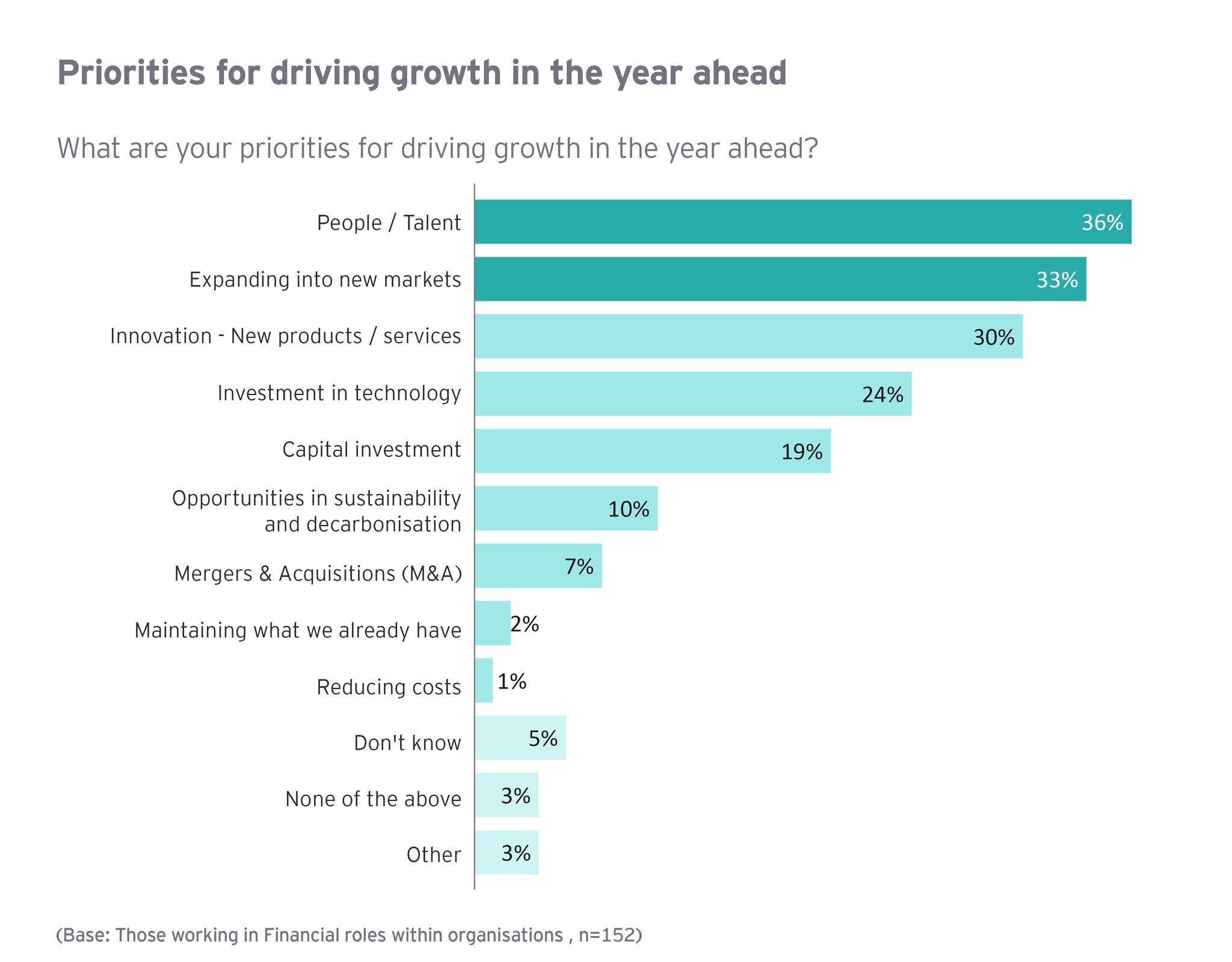
Growth barriers and top priorities: The challenges of inflation and the war for talent – and how that talent is deployed - are reflected in the findings, indicating that today’s CFOs are laser focused on reducing costs and developing talent not just in the short term but over a longer period. 71% of the respondents cited cost reduction and improving efficiencies as one of their biggest priorities over the next five years, with automation and succession planning / talent development each being cited by 28%.
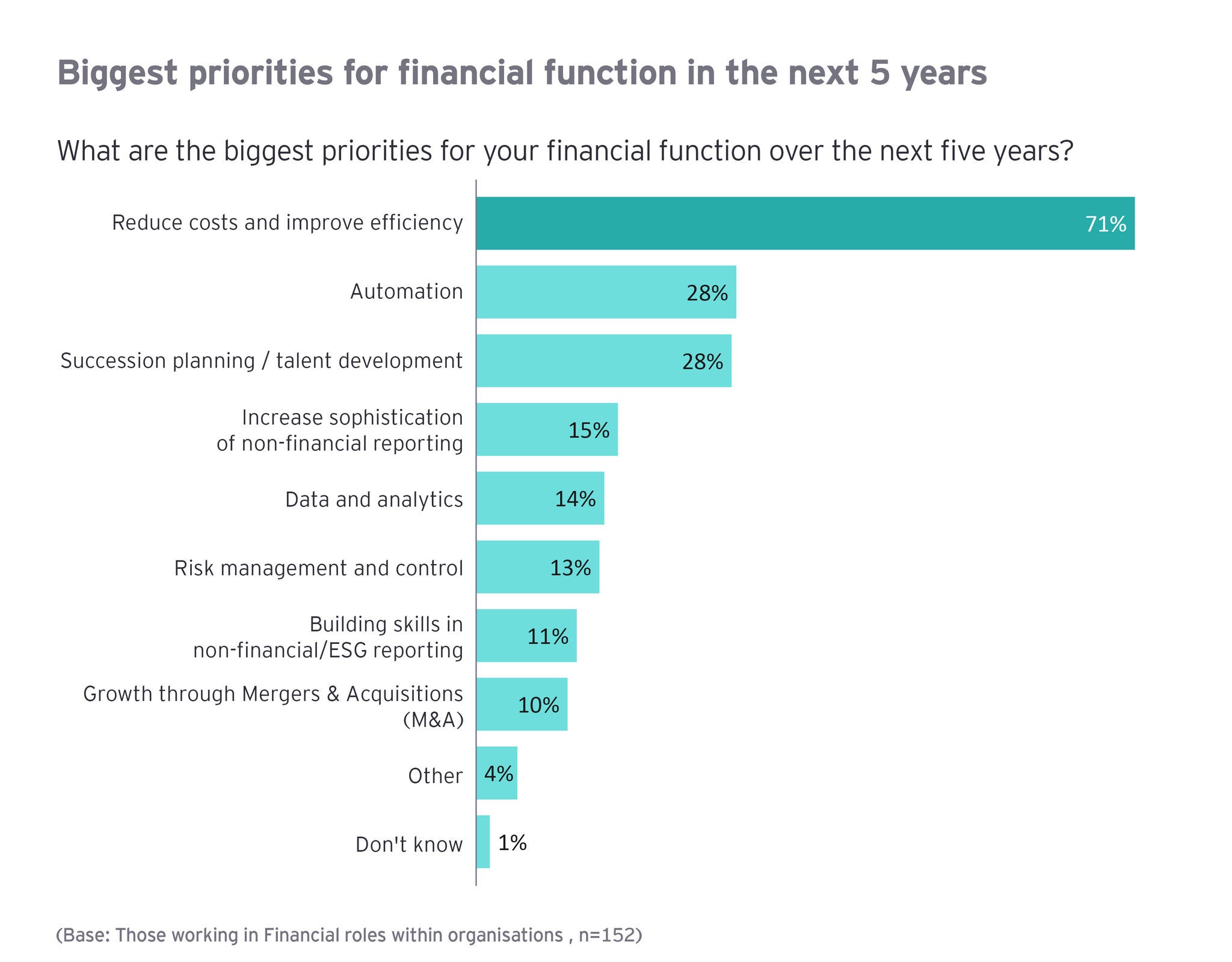
Macroeconomic pressures have heightened the focus on cost and efficiency. Many organisations are looking at how digital technologies such as automation can help them to deliver further efficiencies. Beyond reducing costs, automation can also help improve consistency, quality, control, and traceability, making it a key part of the finance transformation toolset.
“We know from conversations with our clients that finance leaders are acutely aware of the inflationary pressures on their businesses and the need to manage costs. Inflation is expected to jump to 8.5% or higher this year¹, a level not experienced since the 1980s,” said George Deegan.
Issues relating to talent are proving extremely problematic for Ireland’s CFOs today, ranking significantly more highly than inflation (57% and 35%, respectively) as challenges to achieving the desired level of growth over the next five years. Other challenges included regulation, manual processes and controls, short-term costs associated with doing business sustainably, and governance.
Navigating BEPS 2.0: Interestingly, global corporate tax reforms were not specifically called out as representing challenges to growth. This is in line with the findings in relation to readiness for the potential impact of BEPS 2.0, where only 7% of respondents have undertaken some form of modelling and impact assessment. A further 20% appear to be adopting a “wait-and-see” approach pending the publication of more detail, or don’t believe they are currently impacted. With over 50% of respondents currently not sure what action has been taken by the organisation to prepare for the potential impact of BEPS 2.0, a worrying trend around organisational readiness to deal with the substantial changes is emerging, should the 01 January 2023 effective commencement be met.
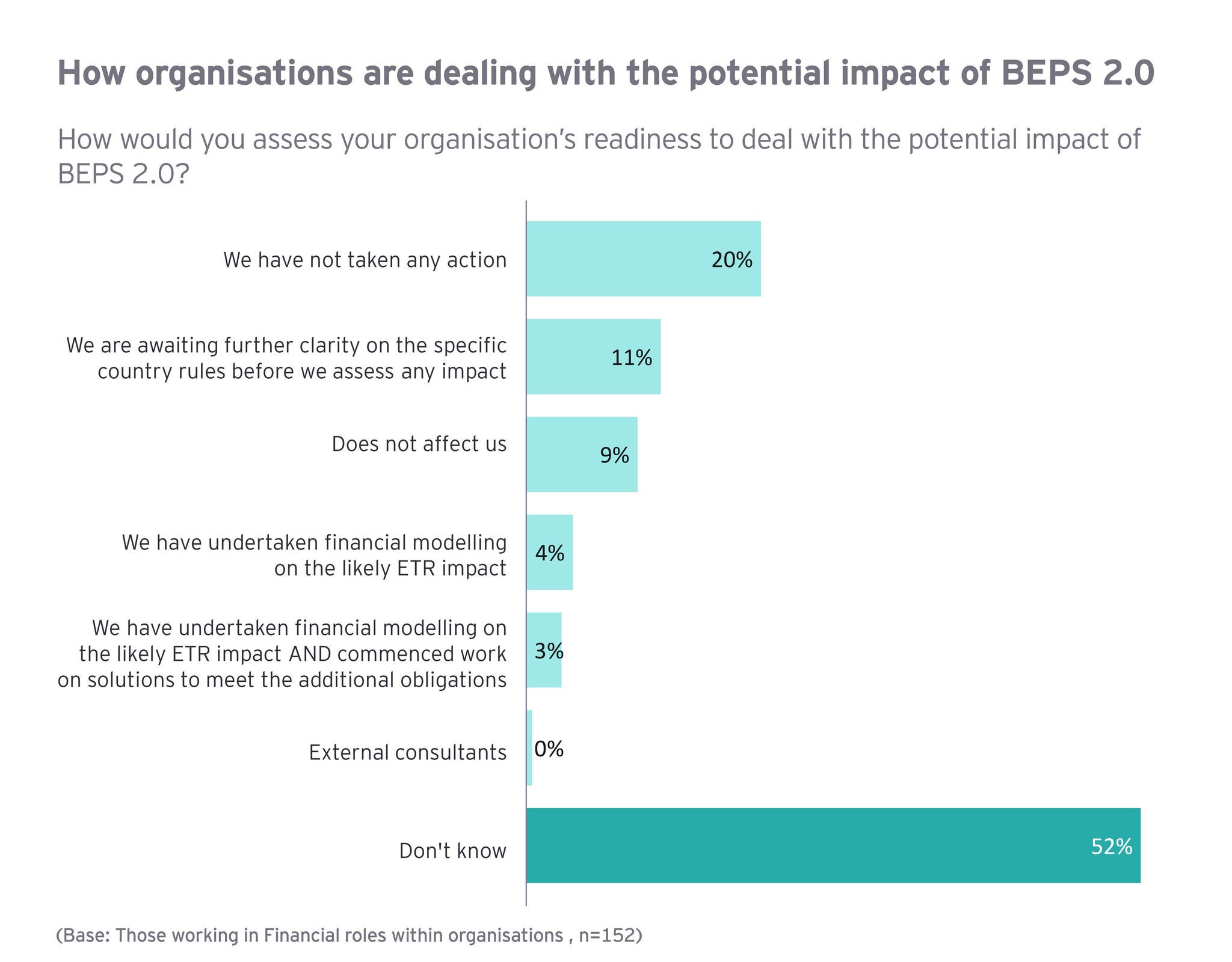
“Should the BEPS 2.0 proposals come into law, how and where organisations pay corporation tax will change - and the impact across businesses operating in Ireland could be substantial. However, results from our survey suggests two things. First, that many organisations have yet to carry out detailed impact assessments. And second, work on organisational readiness is also limited to a few. In the event that the ambitious BEPS 2.0 implementation timeline of 01 January 2023 is met, this will likely result in a lot of heavy lifting by organisations through the second half of this year to be ready for the changes,” said Peadar Andrews, Tax Partner, EY Ireland.

Chapter 3
Talent scarcity a key concern
Succession planning and talent development to be one of the biggest priorities over the next five years.
Talent emerged as the dominant theme in our CFO survey with staff shortages and talent attraction and retention being the most-cited challenge to achieving the desired level of growth in the next five years. 57% of our respondents named this as a key challenge, well ahead of inflation which was mentioned by 35% of the respondents. This is not lost on us, with talent gaps existing across every sector in our economy.
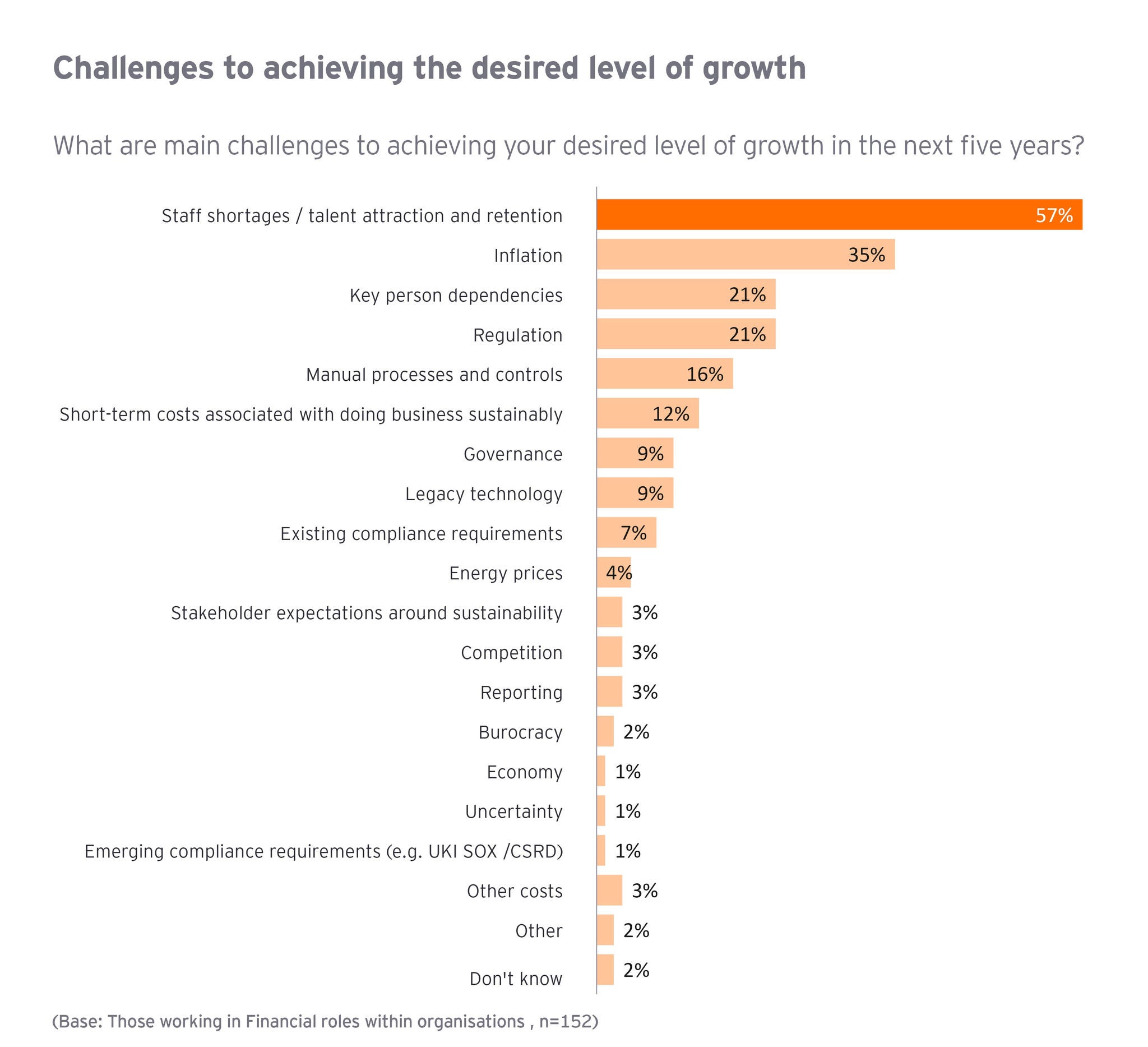
It is, therefore, not surprising that finance functions are understaffed.
Succession planning and talent development were cited by 28% as one of the biggest priorities over the next five years, second in importance only to reducing costs and improving efficiencies. 36% of respondents cited people as a key priority for driving growth in the year ahead.
This has the potential to drive a radical change in the rules of engagement when it comes to attracting and retaining talent. The winning employee propositions of yesterday are no longer guaranteed to be successful in the new paradigm, particularly when finance talent is in such high demand. When it comes to filling the talent gaps, 61% say a key challenge is talent attraction. Of those surveyed, 54% say talent retention is a top challenge.
“Instead of a Great Resignation what we are witnessing is a ‘great re-evaluation’ where employees are keenly re-assessing what they want from their careers, their employers and their lives. This is brought into sharper focus still when we consider the career motivations and expectations of Millennials and Gen Z, as these employee segments occupy an increasing number of roles across organisations,” said Jackie Gilmore, Partner People Advisory Services, EY Ireland.
This is one of the lasting effects of the pandemic where the switch to remote and flexible working along with quite fundamental changes to business models have given employees cause and space to reflect on career and life priorities.
Changing rules of engagement: Barriers to recruitment and retention include increased salary expectations, cited by 49% of the respondents. Of those surveyed, 27% pointed to an imbalance between employee expectations around remote working and the requirements of their role, and that of the team.
Such is the demand for talent that there is a requirement of organisational leaders to consider themselves suppliers to newly onboarded and existing colleagues. Post pandemic there has been an active fine tuning of the employee value proposition, employee experience and wellbeing roles.
Careful consideration of these questions will help to not only attract talent but also to retain and retrain existing talent.
17% of respondents say they are concerned that their finance function does not have the relevant skills to allow the organisation to achieve the desired level of growth in the next five years.
Upskilling and reskilling programmes can be an effective tool for employee engagement and retention. Training forms the main plank of organisations’ response to the finance skills gap. 54% of the respondents to our survey claim that they have internal training programmes to develop and expand skillsets, while 32% say they utilise external training programmes to do so.
In the current environment, an increase in spending on internal and external training programmes will help prime finance functions and organisations to capitalise on the accelerated transformation that has happened over the last two years. It is, therefore, essential to ensure finance leaders and talent are adequately equipped to maximise their own individual impact and that of their finance functions in this new operating environment.
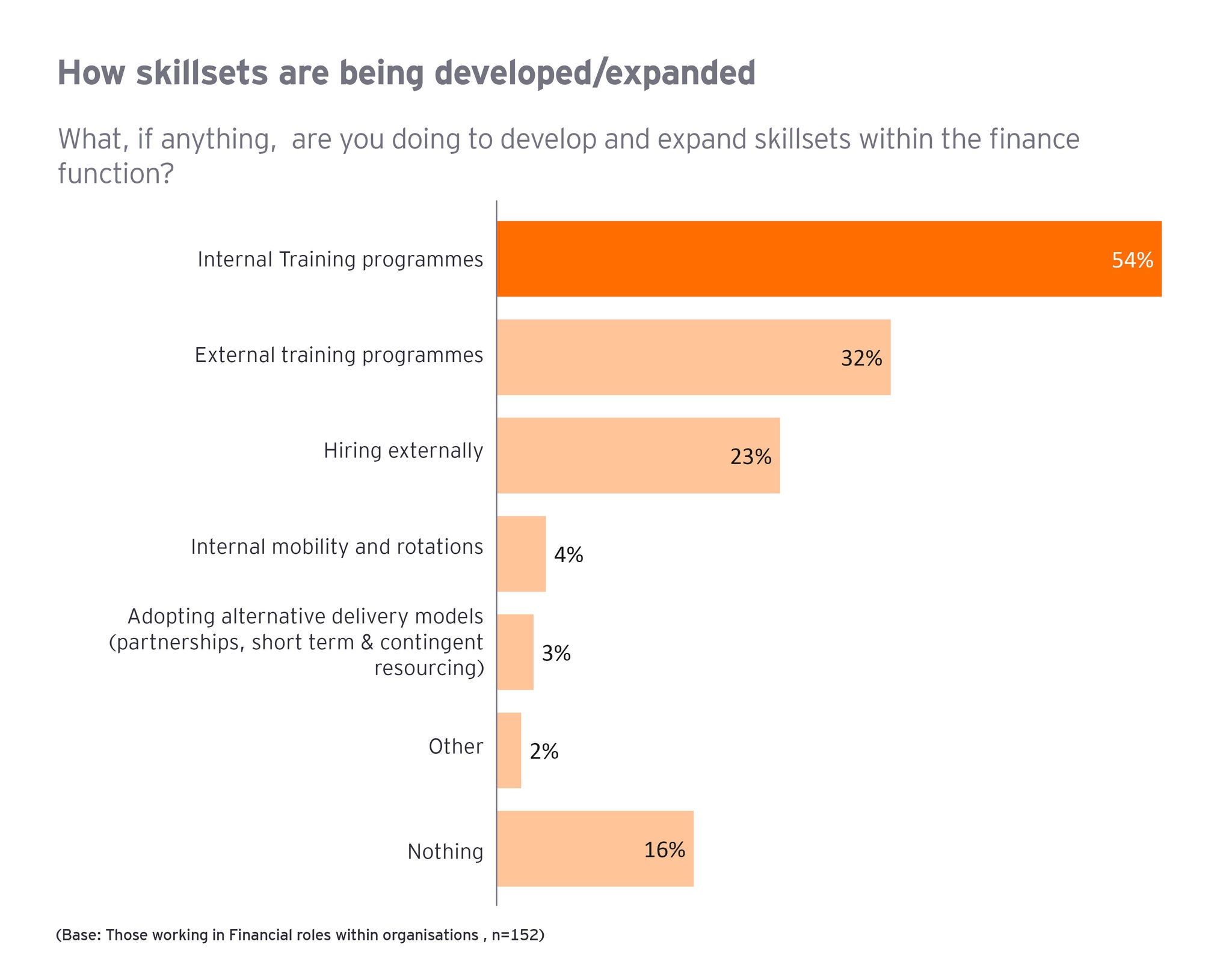
Hiring externally is cited as the preferred response by 23% of respondents despite the acknowledged challenges of doing so in the current environment. Surprisingly, given the clear awareness of the challenges likely to be faced, the adoption of alternative delivery models such as partnerships, and short term and contingent resourcing was cited by just 3% of respondents.
“Finance talent is in short supply in the Irish marketplace. For organisations struggling to attract and retain talent for the future, there is a need to do a root cause analysis. Is it the employee value proposition (which includes financial and non-financial benefits) or is it the type of work they are going to be doing? With technology that is available today, the modern finance professional expects to work in an environment where automation is embraced, and their time and efforts can be spent supporting the business instead of compiling data,” said Katie Burns, Partner Consulting and Finance Transformation Lead, EY Ireland.

Chapter 4
Sustainability, ESG pipped by short-term challenges
Introduction of new regulations likely to elevate importance of non-financial reporting.
The majority of respondents to our survey believe their organisations have an adequate or reasonably high standard of ESG reporting. Of those surveyed, 44% rated the maturity of their organisation’s non-financial/ESG performance monitoring and reporting capability as either established or mature with another 44% rating it as basic. Just 12% said it was not mature.
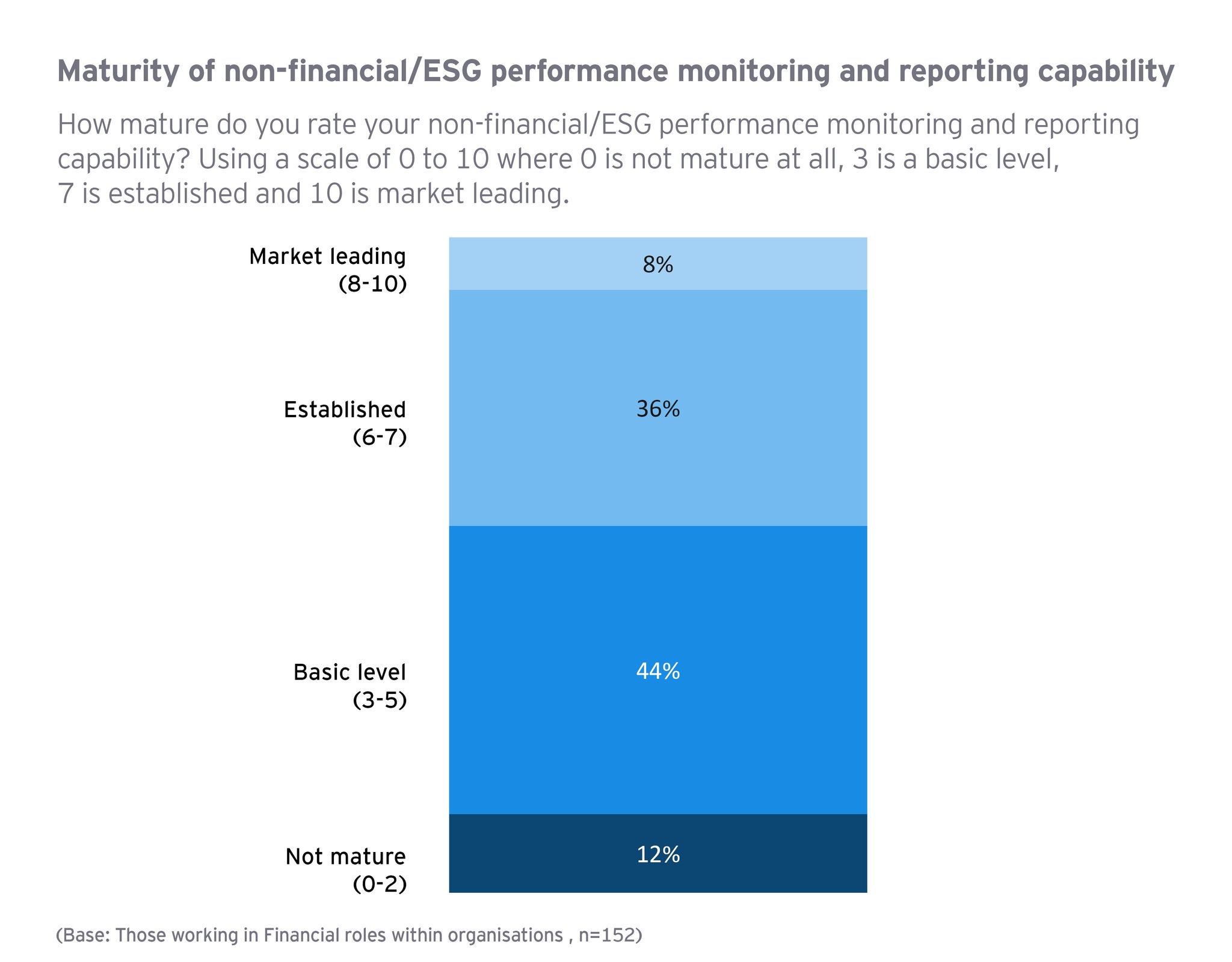
However, this must be viewed in the context of the low priority currently placed on the issue.
Of the finance leaders surveyed, just 15% cited an increase in sophistication of non-financial reporting as one of their biggest priorities for the next five years. Reducing costs and improving efficiencies, automation as well as succession planning/talent development were significantly higher on the CFOs’ list of priorities than building skills and increasing sophistication of non-financial reporting.
Non-financial reporting is the “invisible” future and regularly perceived as hard to determine when there are so many other immediate business challenges. In the short term, sustainability is still seen as a cost to business, and it is just one of many competing business priorities. Increasing regulation such as the introduction of the Corporate Sustainability Reporting Directive (CSRD) from 2024, which will affect many Irish organisations, will introduce non-financial reporting and assurance requirements. This will undoubtedly elevate the importance of this topic for finance leaders. With only 15% citing this as an area of priority, many organisations will be unprepared and risk increasing compliance costs.
52% of those surveyed would like to spend more time on risk management, including climate risk. Another 48% said they wish to spend more time on sustainability regulatory compliance.
The need to manage climate risk through the framework of the Task Force for Climate Related Financial Disclosures (TCFD) is being felt by many organisations. Although not yet regulated in Ireland, the TCFD will become a formal requirement. Many stakeholders, particularly investors, are already embedding these requirements into how they assess companies for their performance, and it is impacting investment and capital allocation decisions made by banks and lenders. It is unsurprising that this is translating into increased focus on climate risk management, and indeed the opportunities that sustainability can present for more innovative companies.
The low priority placed on sustainability issues must be a cause for concern. Sustainability pervades every aspect of an organisation’s performance - from costs through to the ability to attract talent and investment right through to its engagement with customers. It is here that the CFOs can play a bigger role to get organisations to blend sustainability into their long-term growth strategies as sustainability considerations increasingly impact M&A decisions today. And failure to pay due attention to the issue may undermine growth prospects for even the most robust businesses.
“While the low priority placed on ESG and sustainability by finance functions in this survey may be down to the timing of when this study was conducted, it is still a cause for some concern, even more worrying is the apparent disconnect with the rest of the organisation. The finance function of the future must play a much more strategic role and that includes influencing the ESG agenda across the entire organisation. New regulation is also coming fast down the track, so CFOs need to make strides to get ahead of it,” said Derarca Dennis.
There were other reasons cited as well as barriers to undertaking effective ESG reporting.
What is interesting, though, is that 24% of the respondents said they did not know what the barriers are to their organisation undertaking effective ESG reporting.
Role of the Board: The finding in relation to leadership and the openness of the organisation suggests that the problem is not one for the finance function alone. The sustainability agenda needs to be driven from the top down with Board level buy-in, which appears to be a challenge in the majority of organisations surveyed.
The CSRD will require management and Boards to bear explicit responsibility for non-financial reporting. For the most part, sustainability disclosures have been voluntary up to this point. However, this is a turning point. With claims of greenwashing becoming all too common, the sustainability agenda will be front of the Board’s mind when regulatory and reputational risks become too great.
“CFOs are not blind to the sustainability issue and many of them want to spend more time on it. However, our research suggests that CFOs and finance leaders are merely reflecting the attitudes of their organisations’ senior leadership when it comes to the priority placed on the issue. That attitude needs to change quickly if Irish businesses are not to find themselves left behind in a world where sustainability becomes a primary competitive differentiator,” Danny Buckley, Partner Financial Services CFO Advisory, EY Ireland.

Chapter 5
Technology transformation needs a bigger push
Transformative capabilities of technology and analytics in strategic areas of business somewhat underappreciated.
The results of our survey indicate that CFOs and finance leaders are alive to the use of technology to achieve process efficiencies with 24% of respondents identifying technology investment as a priority for driving growth in the next five years. Data and analytics were mentioned by 14% as a significant priority for the finance function. However, the transformative capabilities of technology/automation and analytics in strategic areas of the business appear to be underappreciated.
The quite narrow view of the role of technology can be seen in how it is being leveraged at present. While 28% of respondents did cite automation as a priority for the finance function, a significant majority see its role mainly in lower-value spheres of activity. When it came to expected changes in the operating model in the next five years, 32% said some manual roles will be automated. Most striking were the activities that came bottom of the list.
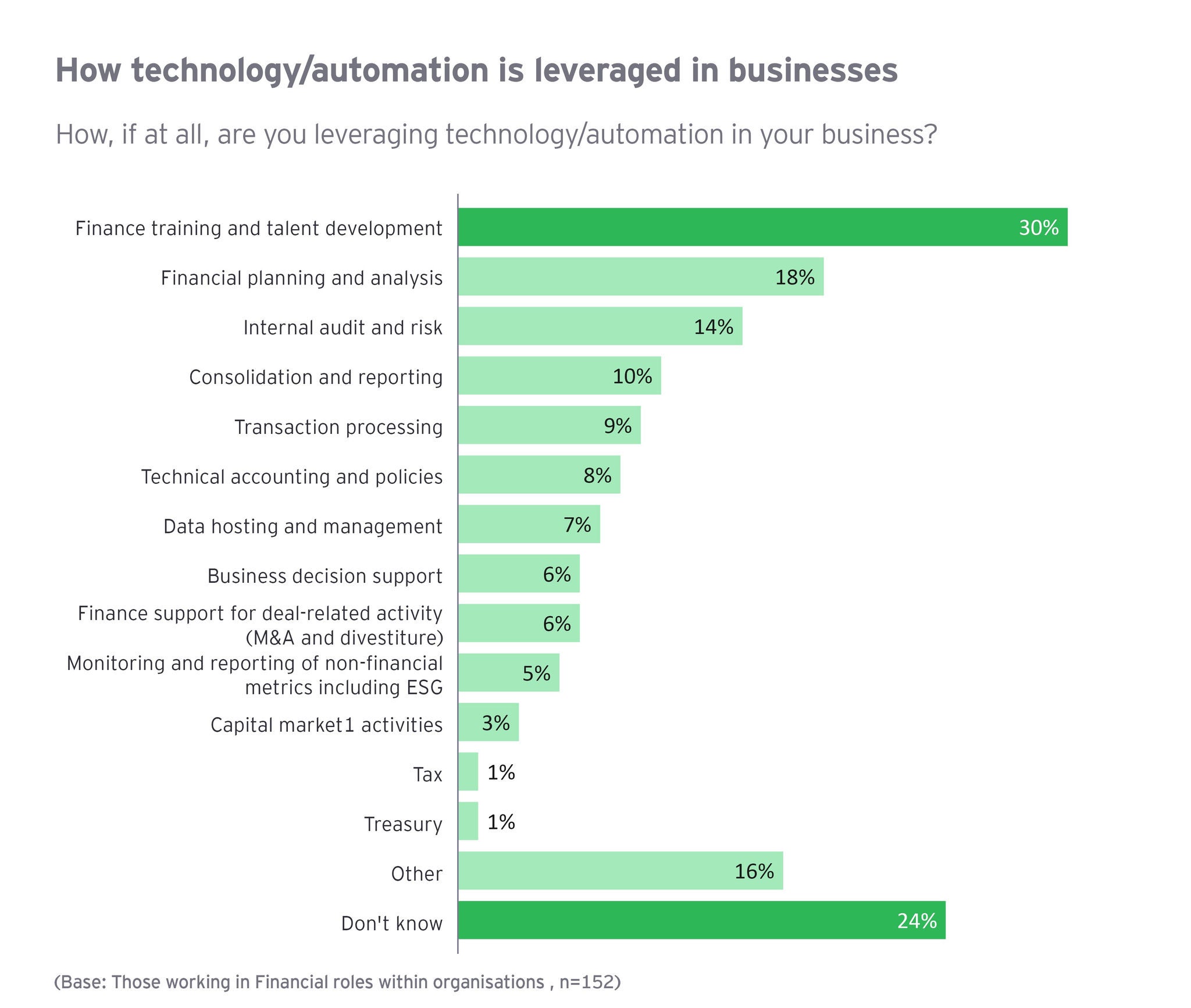
“Organisations that believe digital transformation is central to their future growth but aren’t taking necessary action to evolve will get left behind. Often, they do not believe that they have the required people or processes to achieve their transformation ambitions. These organisations should start by laying the foundations for the adoption of these new technologies now by investing in talent to equip them for the future and streamlining their processes to ready them for digital transformation,” said Katie Burns.
In our survey, 53% of the respondents claimed that their organisation had undertaken a finance transformation or cost optimisation programme within the last five years. However, when it comes to their operating models, many do not foresee any change in the next five. 32% of the respondents said there would be no change at all.
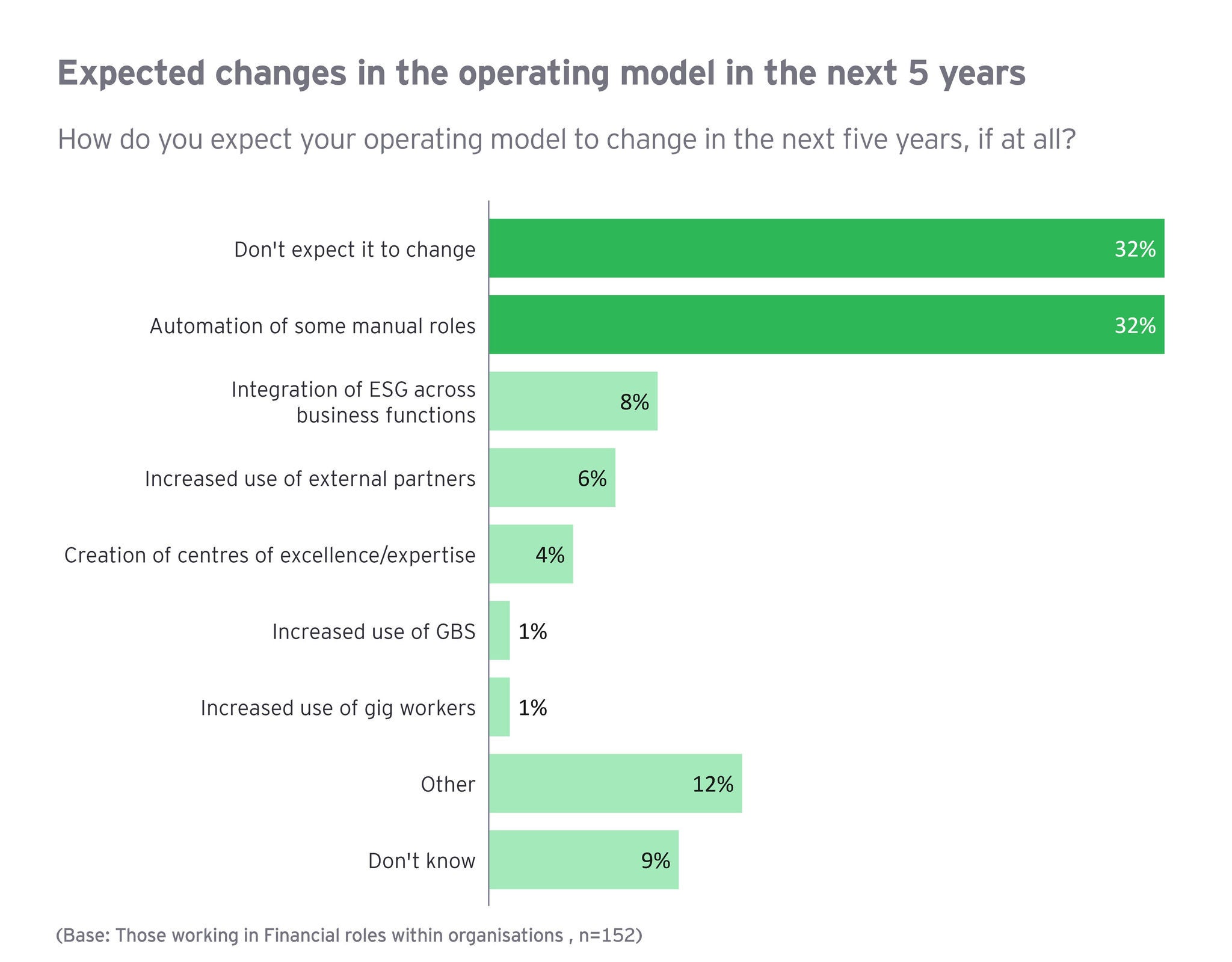
Our survey findings indicate that transformation, digital or otherwise, is quite low down on the agenda for finance functions at present. To keep their organisations relevant in the altered global environment, finance leaders need to bring technology at the heart of finance transformation.
Technology and automation have the power to transform finance functions through the use of machine learning, advanced data analytics, and artificial intelligence. Robotic process automation will certainly alleviate the pressure on understaffed finance functions, but it does not alone have the capacity to transform them and add strategic value to the business. Applying the transformative power of a combination of the latest analytics, robotics, and other technologies can bring new insights, improve decision-making across the business, and help to identify new opportunities.
Looking ahead, when asked to name the key challenges to achieving the desired level of growth in the year ahead, 16% of the respondents cited dependence on manual processes and controls. Legacy technology issues were mentioned by 9%.
This suggests an awareness of the role technology has to play in the operation of the function. That awareness needs to be built upon and turned into a greater understanding for the potential of technology to support and drive change and transformation.
About the Survey
Research for the EY Ireland CFO Survey was carried out during March 2022. 152 people working in financial roles across a broad spectrum of firms responded to the survey. Respondents included CFOs, finance directors, financial controllers, managing directors, operations directors, and business owners. The sectors covered were broadly representative of Irish business generally and included manufacturing, retail, professional services, healthcare, communications, transport, construction, technical services, and agribusiness.
How EY can help
Summary
The results of our inaugural CFO Survey paint a picture of finance functions which are optimistic about the prospects for future growth and prepared to take their place at the strategic heart of their organisations. A cause for concern is the relative lack of attention being paid to the potential impacts of the BEPS 2.0 process and low priority placed on sustainability as a source of growth and value. While change and transformation appear to be low down the agenda for finance leaders, they are ready to respond with agility to the new challenges which will undoubtedly arise in the months and years ahead.



